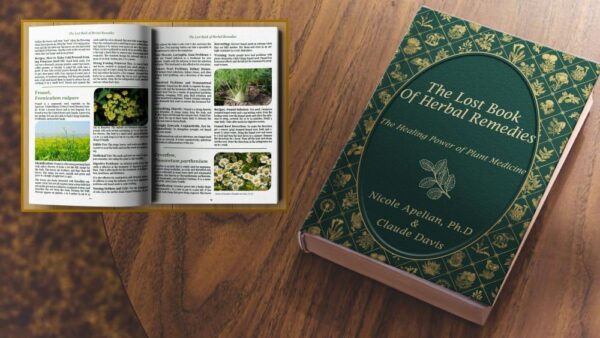The Lost Book of Remedies by Dr. Nicole Apelian is an easy read with easy, accessible directions. It is also very informative. If you need to know how to do something from the thousands of known remedies and cures, this book will help you master those simple, natural cures for all sicknesses. The book consists of thirty-eight well-organized chapters with pictures and illustrations to illustrate each topic.
I especially liked the section on how to use Wild Plants in your yard, the best part of the book. I grew up with Wild Flowers and Plants, they were our “friends” at home, our teachers and our painters. My mother was always telling me how “bad” some of the plants we grew were and she always tried to kill them. But, I always took her at least one plant a week (sometimes more) because she knew so many different herbs and plants for all kinds of sicknesses and diseases that I didn’t think I had a friend around me any more. This book is a fun and quick read with lots of great information.
The Lost Book of Remedies teaches how to make and use several different types of natural and herbal remedies, from Dandelion Tops, Wild Flowers and Violets to Sedative Tea, Lemon balm, and other soothing plants and flowers. I particularly enjoyed the section on Dandelion Tops because, although I am a strong believer in the healing power of nature, sometimes synthetic products just don’t work. You can find some great products in the book. Some of the remedies that are good for both adults and children are very reasonably priced. There are even a few recipes for Dandelion Tea that you can make at home and enjoy a cup (or two) whenever you want. You may also enjoy recipes for various other common, useful plants that can be used both externally and internally.
As with any book, the Lost Book of Remedies has its critics, who question the medicinal properties and possible adverse reactions that could occur from the ingredients found in the book. However, I believe that the book teaches us the secrets of ancient civilizations and what worked long ago for those who practiced it. For example, if a person has a headache, they don’t typically drink tea to solve the problem because they are told that tea makes the problem worse and they shouldn’t drink tea because there are many other health problems associated with tea. The book solves the problem in an all-natural and safe way.
However, even if the book does contain information that can save you money by curing your ailments without using harmful chemicals, the author doesn’t necessarily recommend the purchase of the book. She acknowledges that while the herbs in the book are natural, it is not a guarantee that they will be beneficial to you. However, after you get confused over the hundreds of possible combinations of plants and herbs that will help you with your problems, you’ll probably wonder whether the book should have been titled The All-Natural Way to Health. After all, no one would want to buy a product based on false information, right? The book’s authors explain that they aren’t doctors and can’t promise you that the combination of plants will cure your particular ailment. But if you take the time to read the informative text and learn a bit about how plants work, the remedies should have a chance of working for you.
The Lost Book of Remedies isn’t the first book to touch upon the topic of ancient remedies. However, it is the first one that I have personally used and I have to say that the treatment methods presented are much simpler than the ones I had read about in class and elsewhere. It would be difficult to find someone who has taken the time to research and describe all of the ways that herbs can help us. This book is not a book that will cure everything that is wrong with our bodies. But, if you are serious about taking better care of yourself and feeling better, you may find that the remedies presented in The Lost Book of Remedies are just what you need.

